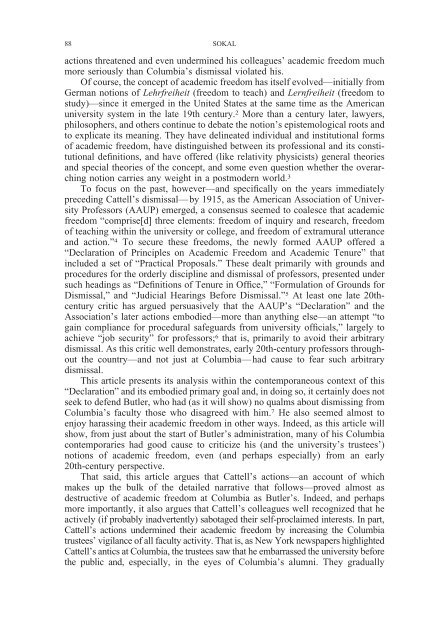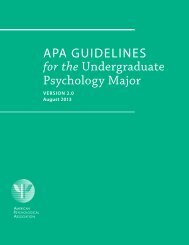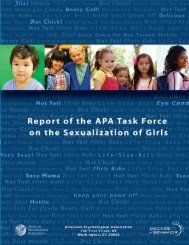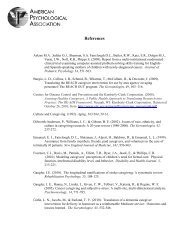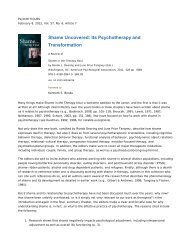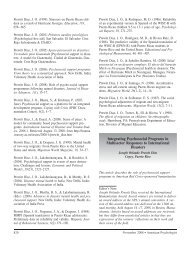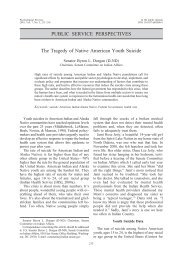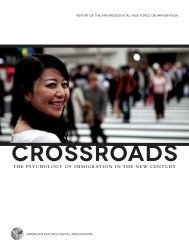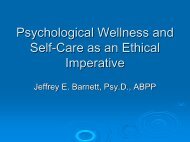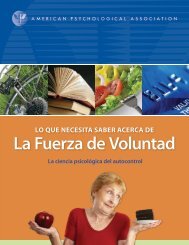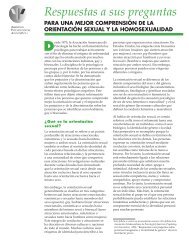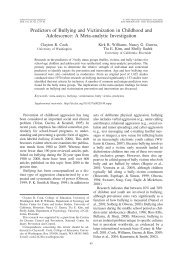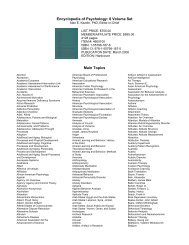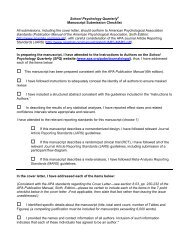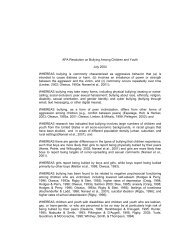James McKeen Cattell, Nicholas Murray Butler, and Academic ...
James McKeen Cattell, Nicholas Murray Butler, and Academic ...
James McKeen Cattell, Nicholas Murray Butler, and Academic ...
You also want an ePaper? Increase the reach of your titles
YUMPU automatically turns print PDFs into web optimized ePapers that Google loves.
88 SOKAL<br />
actions threatened <strong>and</strong> even undermined his colleagues’ academic freedom much<br />
more seriously than Columbia’s dismissal violated his.<br />
Of course, the concept of academic freedom has itself evolved—initially from<br />
German notions of Lehrfreiheit (freedom to teach) <strong>and</strong> Lernfreiheit (freedom to<br />
study)—since it emerged in the United States at the same time as the American<br />
university system in the late 19th century. 2 More than a century later, lawyers,<br />
philosophers, <strong>and</strong> others continue to debate the notion’s epistemological roots <strong>and</strong><br />
to explicate its meaning. They have delineated individual <strong>and</strong> institutional forms<br />
of academic freedom, have distinguished between its professional <strong>and</strong> its constitutional<br />
definitions, <strong>and</strong> have offered (like relativity physicists) general theories<br />
<strong>and</strong> special theories of the concept, <strong>and</strong> some even question whether the overarching<br />
notion carries any weight in a postmodern world. 3<br />
To focus on the past, however—<strong>and</strong> specifically on the years immediately<br />
preceding <strong>Cattell</strong>’s dismissal—by 1915, as the American Association of University<br />
Professors (AAUP) emerged, a consensus seemed to coalesce that academic<br />
freedom “comprise[d] three elements: freedom of inquiry <strong>and</strong> research, freedom<br />
of teaching within the university or college, <strong>and</strong> freedom of extramural utterance<br />
<strong>and</strong> action.” 4 To secure these freedoms, the newly formed AAUP offered a<br />
“Declaration of Principles on <strong>Academic</strong> Freedom <strong>and</strong> <strong>Academic</strong> Tenure” that<br />
included a set of “Practical Proposals.” These dealt primarily with grounds <strong>and</strong><br />
procedures for the orderly discipline <strong>and</strong> dismissal of professors, presented under<br />
such headings as “Definitions of Tenure in Office,” “Formulation of Grounds for<br />
Dismissal,” <strong>and</strong> “Judicial Hearings Before Dismissal.” 5 At least one late 20thcentury<br />
critic has argued persuasively that the AAUP’s “Declaration” <strong>and</strong> the<br />
Association’s later actions embodied—more than anything else—an attempt “to<br />
gain compliance for procedural safeguards from university officials,” largely to<br />
achieve “job security” for professors; 6 that is, primarily to avoid their arbitrary<br />
dismissal. As this critic well demonstrates, early 20th-century professors throughout<br />
the country—<strong>and</strong> not just at Columbia—had cause to fear such arbitrary<br />
dismissal.<br />
This article presents its analysis within the contemporaneous context of this<br />
“Declaration” <strong>and</strong> its embodied primary goal <strong>and</strong>, in doing so, it certainly does not<br />
seek to defend <strong>Butler</strong>, who had (as it will show) no qualms about dismissing from<br />
Columbia’s faculty those who disagreed with him. 7 He also seemed almost to<br />
enjoy harassing their academic freedom in other ways. Indeed, as this article will<br />
show, from just about the start of <strong>Butler</strong>’s administration, many of his Columbia<br />
contemporaries had good cause to criticize his (<strong>and</strong> the university’s trustees’)<br />
notions of academic freedom, even (<strong>and</strong> perhaps especially) from an early<br />
20th-century perspective.<br />
That said, this article argues that <strong>Cattell</strong>’s actions—an account of which<br />
makes up the bulk of the detailed narrative that follows—proved almost as<br />
destructive of academic freedom at Columbia as <strong>Butler</strong>’s. Indeed, <strong>and</strong> perhaps<br />
more importantly, it also argues that <strong>Cattell</strong>’s colleagues well recognized that he<br />
actively (if probably inadvertently) sabotaged their self-proclaimed interests. In part,<br />
<strong>Cattell</strong>’s actions undermined their academic freedom by increasing the Columbia<br />
trustees’ vigilance of all faculty activity. That is, as New York newspapers highlighted<br />
<strong>Cattell</strong>’s antics at Columbia, the trustees saw that he embarrassed the university before<br />
the public <strong>and</strong>, especially, in the eyes of Columbia’s alumni. They gradually


